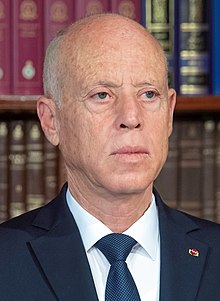President of Tunisia
The president of Tunisia, formally known as the president of the Republic of Tunisia (Arabic: رئيس الجمهورية التونسية, French: Président de la République Tunisienne), is the head of state of Tunisia. Tunisia is a semi-presidential republic, whereby the president is the head of state and the prime minister (named Head of Government of Tunisia) is head of government. Under Article 77 of the Constitution of Tunisia, the president is also the commander-in-chief of the Tunisian Armed Forces.[2] The current president is Kais Saied who held this position since 23 October 2019 following the death of Beji Caid Essebsi on 25 July 2019.
| President of the Republic of Tunisia
رئيس الجمهورية التونسية Président de la République Tunisienne | |
|---|---|
 Presidential Seal | |
Standard of the President of Tunisia | |
| Style | His Excellency (Son Excellence) |
| Residence | Palace of the Republic, Carthage |
| Term length | Five years, renewable once |
| Inaugural holder | Habib Bourguiba |
| Formation | 25 July 1957 |
| Salary | 16,700 USD annually[1] |
| Website | www |
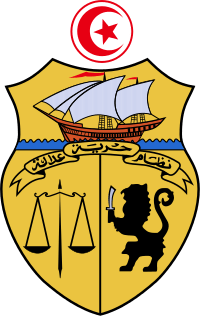 |
|---|
| This article is part of a series on the politics and government of Tunisia |
|
|
|
Judiciary |
|
Administrative divisions |
|
|
|
|
Elections
The president is directly elected by universal suffrage by majority, with a second round between the top two candidates, if neither receives an absolute majority in the first round. A presidential candidate must be at least 35 years old on the day of filing for candidacy, and must be a Muslim. The candidate must have a Tunisian nationality, and must abandon any other nationality.
Role and powers
The president's role and powers are defined in title four, part one of the constitution. In addition to being the head of state, the president is also commander-in-chief of the armed forces. The president is limited to a maximum of two terms, and may not hold a partisan position while serving as president. The president and the prime minister have executive roles, with the executive power being exercised by the president and the government (dual executive). The Assembly of the Representatives of the People has the right to, by majority, present a motion to impeach the president for a grave violation of the constitution; such a motion would have to be approved by a two-thirds majority of both the Assembly and the Constitutional Court.
Article 77 specifies that the president is responsible for the general state of defence, foreign policy and national security, after consultation with the head of government.
Article 78 specifies that the president is responsible for appointing and dismissing:
- The Grand Mufti of the Tunisian Republic
- Individuals in senior positions in the Presidency of the Republic and dependent institutions.
- Individuals in senior military and diplomatic positions, and related to national security, after consultation with the Head of Government.
- The head of the central bank, upon proposal from the head of government after approval from the Assembly of the Representatives of the People.
Article 80 specifies that in exceptional circumstances, the president, after consultation with the government and the president of the Assembly, may take measures necessitated by the circumstances.
Article 81 specifies that the president has the responsibility of signing laws, and ensure their publication. With the exception of draft constitutional laws, the president has the right to return laws to the assembly with an explanation. A returned law requires approval by an absolute majority of assembly members (as opposed to a majority of members present), or in the case of an organic law, three-fifths of the assembly members.
Article 82 specifies that the president may in exceptional circumstances put certain draft laws to a referendum.
Article 87 specifies that the president enjoys legal immunity while in office. [2]
History
Since the promulgation of a republican constitution in June 1959, three years after gaining independence from France, Tunisia has had just four directly elected presidents. The first president was Habib Bourguiba, who became the country's first president after the proclamation of a republic in 1957; he had been the country's de facto leader as prime minister since independence in 1956. He was formally elected to the post in 1959, and was proclaimed president for life in 1975. He was removed from office in a coup d'état in 1987 by Prime Minister Zine El Abidine Ben Ali after being declared medically unfit to continue in office. Ben Ali ascended as acting president, was elected in his own right in 1989 and served until 2011, when he was forced from office during an uprising against his rule. In the country's first free presidential election, held in December 2014, Beji Caid Essebsi was elected in the second round.
For most of its history as an independent state, Tunisia lacked political democracy in the Western sense, and saw widespread violations of human rights. Because of this, presidential elections in Tunisia, such as that of 2009, lacked international credibility. Elections resulted in implausibly high margins for the ruling party, the Constitutional Democratic Rally and its previous incarnations as the Neo Destour party and the Socialist Destourian Party.
Prior to 1999, presidential candidates had to be endorsed by at least 30 political figures—a realistic possibility only for a candidate from a well-organized party like the RCD. Given the RCD's near-total domination of Tunisian politics, opposition candidates found it impossible to get their nomination papers signed. Even when this requirement was lifted, incumbent Ben Ali was reelected three more times by implausibly high margins; his lowest margin was 89 percent in 2009.
Tunisia's original republican constitution vested the president with sweeping executive and legislative powers. Indeed, within the context of the system, he was a virtual dictator. He was elected for a term of five years, with no term limits. In 1975, five months after winning his third full term, Bourguiba was named president for life. From 1987 to 2002, a president was limited to three five-year terms, with no more than two in a row. However, this provision was removed in June 2002.
The 2014 Constitution retained the presidency as the key institution, but hedged it about with numerous checks and balances to prevent a repeat of past authoritarian excesses. Most notably, a president is limited to two five-year terms, even if they are non-successive. The Constitution explicitly forbids any amendment to increase the length of a president's term or allow him to run for more than two terms.
Under the current constitution, the president is primarily responsible for foreign policy, defense and national security, while the Head of Government (prime minister) is responsible for domestic policy.[3]
2011 presidential transition
Following Zine El Abidine Ben Ali's ousting in January 2011, prime minister Mohamed Ghannouchi invoked article 56 of the Constitution regarding temporary absence of the president to assume the role of acting president.[4] This move was deemed unconstitutional by the Constitutional Court hours later and President of the Chamber of Deputies Fouad Mebazaa was appointed as acting president based on article 57 of the Constitution regarding permanent absence of the president.[5] On December 12, 2011, Moncef Marzouki was elected by the newly formed Constituent Assembly as interim president of the Republic.
Living former presidents
The three living former Tunisian presidents, including one acting president :
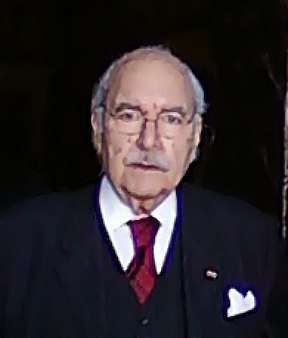
Fouad Mebazaa
(2011)
June 15, 1933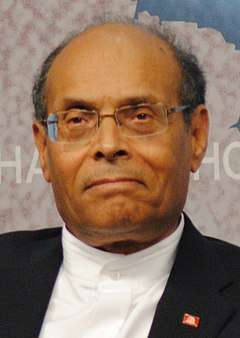
Moncef Marzouki
(2011–2014)
July 7, 1945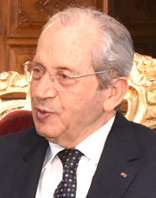
Mohamed Ennaceur
(acting)
(2019)
March 21, 1934
Latest election
| Candidate | Party | First round | Second round | |||
|---|---|---|---|---|---|---|
| Votes | % | Votes | % | |||
| Kais Saied | Independent | 620,711 | 18.40 | 2,777,931 | 72.71 | |
| Nabil Karoui | Heart of Tunisia | 525,517 | 15.58 | 1,042,894 | 27.29 | |
| Abdelfattah Mourou | Ennahda Movement | 434,530 | 12.88 | |||
| Abdelkrim Zbidi | Independent | 361,864 | 10.73 | |||
| Youssef Chahed | Long Live Tunisia | 249,049 | 7.38 | |||
| Safi Saïd | Independent | 239,951 | 7.11 | |||
| Lotfi Mraihi | Republican People's Union | 221,190 | 6.56 | |||
| Seifeddine Makhlouf | Dignity Coalition | 147,351 | 4.37 | |||
| Abir Moussi | Free Destourian Party | 135,461 | 4.02 | |||
| Mohamed Abbou | Democratic Current | 122,287 | 3.63 | |||
| Moncef Marzouki | Movement Party | 100,338 | 2.97 | |||
| Mehdi Jomaa | Tunisian Alternative | 61,371 | 1.82 | |||
| Mongi Rahoui | Popular Front | 27,355 | 0.81 | |||
| Hechmi Hamdi | Current of Love | 25,284 | 0.75 | |||
| Hamma Hammami | Independent | 23,252 | 0.69 | |||
| Elyes Fakhfakh | Ettakatol | 11,532 | 0.34 | |||
| Saïd Aïdi | Beni Watani | 10,198 | 0.30 | |||
| Omar Mansour | Independent | 10,160 | 0.30 | |||
| Mohsen Marzouk | Machrouu Tounes | 7,376 | 0.22 | |||
| Hamadi Jebali | Independent | 7,364 | 0.22 | |||
| Néji Jalloul | Independent | 7,166 | 0.21 | |||
| Abid Briki | Tunisia Forward | 5,799 | 0.17 | |||
| Selma Elloumi Rekik | Al Amal | 5,093 | 0.15 | |||
| Mohamed Esghaier Nouri | Independent | 4,598 | 0.14 | |||
| Slim Riahi | New National Union | 4,472 | 0.13 | |||
| Hatem Boulabiar | Independent | 3,704 | 0.11 | |||
| Blank votes | 23,867 | – | 15,912 | – | ||
| Invalid votes | 68,344 | – | 55,348 | – | ||
| Total | 3,465,184 | 100.00 | 3,892,085 | 100.00 | ||
| Registered voters/turnout | 7,074,566 | 48.98 | 7,074,566 | 55.02 | ||
| Source: ISIE, ISIE | ||||||
See also
- Tunisia
- List of Beys of Tunis
- List of French residents-general in Tunisia
- List of Presidents of Tunisia
- List of Presidents of Tunisia by age
- First Lady of Tunisia
- Head of Government of Tunisia
- Lists of office-holders
- List of current heads of state and government
References
- "The highest and lowest paid African presidents - Business Daily". Business Daily.
- "Title four, chapter one". THE CONSTITUTION OF THE TUNISIAN REPUBLIC (Unofficial English translation) (PDF). UNDP and International IDEA. 26 January 2014. Archived from the original (PDF) on 23 September 2015. Retrieved 15 April 2015.
- Anthony Dworkin (12 September 2019). "Tunisia's unpredictable elections". European Council on Foreign Relations.
- "Constitutional debate". Aljazeera. 14 January 2011. Retrieved 17 October 2019.
- Ahram
